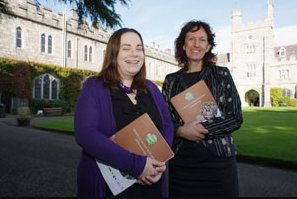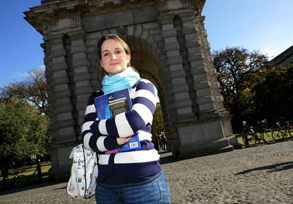
UCC Student Anne-Marie Scarry with Disability Support Officer Mary O'Grady
The Disability Access Route to Education (DARE), aimed at all school leavers with disabilities, is being launched by the seven universities, Athlone IT, DIT, National College of Ireland and the Mater Dei Institute of Education. This supplementary admissions scheme recognises the impact of disability on educational attainment and on progression to higher education. Approximately 300 students accepted places through DARE in 2009. The eleven participating colleges aim to greatly increase this number in 2010 by offering on average 5% of first year places on a reduced points basis.
Significant improvements have been made to the DARE scheme through funding provided by the government’s Strategic Innovation Fund (SIF). The Disability Access Route to Education is now based on robust criteria, has a more streamlined application process through the CAO and is more student friendly. The purpose of the national launch is to make students, schools and organisations aware of the scheme and ultimately to encourage a greater number of applications. A dedicated website, www.accesscollege.ie, has been developed which contains full details of the scheme and will assist students in making their applications.
Due to the impact of their disability students may not be able to meet the leaving certificate points for their preferred college course. HEA figures confirm that in the 07/08 academic year, only 1,389 or 4.2% of all new entrants to higher education indicated that they had one or more disabilities. The DARE initiative will play a key role in driving towards the HEA target of doubling the number of students in 3rd level with sensory, physical and multiple disabilities by 2013. Current participation rates are estimated at 15 -17 % for people with sensory disabilities and 14-16 % for people with physical disabilities. These participation rates are well below the current national entry rates of 55%.
According to Maureen Dunne, spokesperson for the DARE scheme, “Students with disabilities experience constant and complex challenges throughout their educational experience which makes it difficult for them to reach their full education potential. As well as health issues many students have low expectations of their ability to progress to higher education.”
There has been a huge emphasis in higher education in recent years on providing equality of educational opportunity for students with disabilities through dedicated disability support services. These services focus on supporting the student’s transition from 2nd to 3rd level as well as the provision of supports based on individualised needs assessments to enable access and full participation by all students with a disability. These supports address the educational, technological and personal needs of the students and are funded by the HEA and the Department of Education and Science through the Fund for Students with a Disability, backed by the European Social Fund (ESF).
According to Vivian Rath, science graduate and former UCD Student’s union Vice President and Welfare Officer, “With the help of the Disability Support Service once I began university I started to forget about my disability and focused on my many abilities. The support provided allowed me to participate fully in all the college activities such as debating, wheelchair basketball, student societies and the students union.”

Supporter of the DARE Scheme - TCD Dentistry Student Emma Clarke
Support for the scheme:
“DARE is an excellent support scheme which helps students with disabilities engage in higher education so that they can realise their full potential. Access should be universal but sometimes it’s the little things that can get in the way. DARE assists prospective students in overcoming barriers in accessing education and in doing so helps create a more inclusive society which benefits everybody – able and disabled people alike”.
Caroline Casey, Social Entrepreneur, Founder of Kanchi and the O2 Ability Awards
Ends
For further information contact: Lia O’Sullivan, Communications Manager, Irish Universities Association. Telephone: 01 6764948, 085 7141414. Email: lia.osullivan@iua.ie
Better Options Events
Third Level Institutions will provide information on application procedures, course details and the various supports available for students with disabilities and specific learning difficulties. Students will also be in attendance to talk about their experiences.
- 28th October from 10am to 2.00pm in University of Limerick
- 17th November from 10am to 3.00pm in University College Cork
- 10th December from 11am to 3.00pm in University College Dublin
More Information: